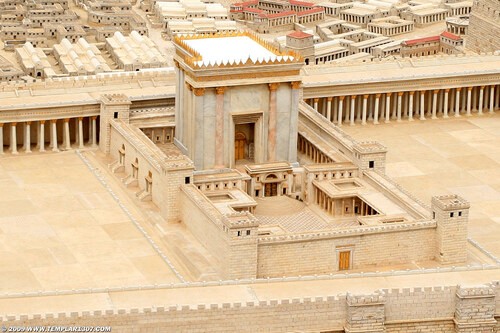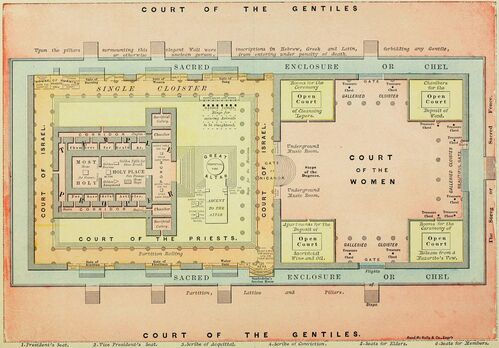July 1st, 2025
JESUS FULFILLS SCRIPTURE ENTERING THE TEMPLE
Luke 19:45-48
Have you ever wondered why we don't face Jerusalem when we pray or bring animals for sacrifice to church? The answer lies in a profound shift that occurred two thousand years ago, transforming our understanding of worship and our relationship with God.
Picture this: A bustling temple courtyard, filled with the bleating of sheep, the cooing of doves, and the clink of coins changing hands. This was meant to be a place of prayer, of connection with the divine. Instead, it had become a marketplace, a den of exploitation where religious leaders lined their pockets at the expense of sincere worshippers.
Into this scene walks Jesus. With righteous anger, he overturns tables, drives out the merchants, and declares, "My house shall be called a house of prayer, but you have made it a den of robbers." This wasn't just about cleaning up a physical space. It was a powerful statement about the nature of true worship and the coming of a new covenant between God and humanity.
Into this scene walks Jesus. With righteous anger, he overturns tables, drives out the merchants, and declares, "My house shall be called a house of prayer, but you have made it a den of robbers." This wasn't just about cleaning up a physical space. It was a powerful statement about the nature of true worship and the coming of a new covenant between God and humanity.


The temple in Jerusalem was designed to be the meeting place between God and His people. It was a sacred space, with increasingly restricted areas culminating in the Holy of Holies, where only the high priest could enter once a year. But over time, the very practices meant to facilitate worship had become barriers. The court of the Gentiles, the outermost area where non-Jews could come to seek God, had been turned into a noisy bazaar. Those in charge were more concerned with profit than with people's spiritual needs.
Jesus' actions in cleansing the temple weren't just about restoring order. They were a sign that something greater was coming. He was ushering in a new era where access to God would no longer be limited by physical spaces or ritualistic requirements. As He later told the Samaritan woman at the well, "The hour is coming when you will worship the Father neither on this mountain nor in Jerusalem... true worshipers will worship the Father in spirit and truth."
This shift is beautifully explained in the book of Hebrews: "Therefore, brothers and sisters, since we have confidence to enter the Most Holy Place by the blood of Jesus, by a new and living way opened for us through the curtain, that is, his body... let us draw near to God with a sincere heart and with the full assurance that faith brings." (Hebrews 10:19-22)
The implications of this are staggering. No longer do we need a physical temple or a human priest to mediate our relationship with God. Through Christ's sacrifice, we have direct access to the Father. But it goes even further than that.
The apostle Paul reveals an astounding truth: "Do you not know that you are a temple of God and that the Spirit of God dwells in you?" (1 Corinthians 3:16) This isn't just poetic language. It's a radical redefinition of what it means to be in relationship with God. The divine presence that once dwelled in a building made by human hands now resides within every believer.
Think about that for a moment. Wherever you go, whatever you do, God is with you. Not just watching from afar, but living within you. This is both incredibly comforting and deeply challenging. It means we carry the presence of God into every situation, every relationship, every decision we make.
This indwelling presence should transform the way we live. Paul goes on to say that our bodies are holy, set apart for God's purposes. This isn't about following a set of external rules, but about allowing God's Spirit to work from the inside out, producing the fruit of "love, joy, peace, patience, kindness, goodness, faithfulness, gentleness, and self-control." (Galatians 5:22-23)
It's important to note that this transformation isn't something we achieve through our own efforts. It's the result of surrendering to God's work within us. Just as Jesus drove out those who were exploiting the temple, He wants to cleanse our hearts of anything that hinders our relationship with Him.
This new understanding of our relationship with God should radically change how we approach worship and service. We don't go to church to encounter God – we bring His presence with us. Our gatherings are not about performing rituals or following traditions, but about encouraging one another and spurring each other on to love and good deeds.
Moreover, this truth should impact every aspect of our lives. If we are truly temples of the Holy Spirit, how should that influence our choices in entertainment, our work ethic, our relationships? It's a call to live with intentionality and awareness, recognizing that we carry God's presence wherever we go.
Yet, we must be careful not to fall into the same trap as those Jesus confronted in the temple. It's easy to turn even this beautiful truth into a form of religious pride or a means of manipulating others. True spirituality is not about outward appearances or using God for personal gain. It's about allowing His love to flow through us, transforming us and impacting the world around us.
Jesus' actions in cleansing the temple weren't just about restoring order. They were a sign that something greater was coming. He was ushering in a new era where access to God would no longer be limited by physical spaces or ritualistic requirements. As He later told the Samaritan woman at the well, "The hour is coming when you will worship the Father neither on this mountain nor in Jerusalem... true worshipers will worship the Father in spirit and truth."
This shift is beautifully explained in the book of Hebrews: "Therefore, brothers and sisters, since we have confidence to enter the Most Holy Place by the blood of Jesus, by a new and living way opened for us through the curtain, that is, his body... let us draw near to God with a sincere heart and with the full assurance that faith brings." (Hebrews 10:19-22)
The implications of this are staggering. No longer do we need a physical temple or a human priest to mediate our relationship with God. Through Christ's sacrifice, we have direct access to the Father. But it goes even further than that.
The apostle Paul reveals an astounding truth: "Do you not know that you are a temple of God and that the Spirit of God dwells in you?" (1 Corinthians 3:16) This isn't just poetic language. It's a radical redefinition of what it means to be in relationship with God. The divine presence that once dwelled in a building made by human hands now resides within every believer.
Think about that for a moment. Wherever you go, whatever you do, God is with you. Not just watching from afar, but living within you. This is both incredibly comforting and deeply challenging. It means we carry the presence of God into every situation, every relationship, every decision we make.
This indwelling presence should transform the way we live. Paul goes on to say that our bodies are holy, set apart for God's purposes. This isn't about following a set of external rules, but about allowing God's Spirit to work from the inside out, producing the fruit of "love, joy, peace, patience, kindness, goodness, faithfulness, gentleness, and self-control." (Galatians 5:22-23)
It's important to note that this transformation isn't something we achieve through our own efforts. It's the result of surrendering to God's work within us. Just as Jesus drove out those who were exploiting the temple, He wants to cleanse our hearts of anything that hinders our relationship with Him.
This new understanding of our relationship with God should radically change how we approach worship and service. We don't go to church to encounter God – we bring His presence with us. Our gatherings are not about performing rituals or following traditions, but about encouraging one another and spurring each other on to love and good deeds.
Moreover, this truth should impact every aspect of our lives. If we are truly temples of the Holy Spirit, how should that influence our choices in entertainment, our work ethic, our relationships? It's a call to live with intentionality and awareness, recognizing that we carry God's presence wherever we go.
Yet, we must be careful not to fall into the same trap as those Jesus confronted in the temple. It's easy to turn even this beautiful truth into a form of religious pride or a means of manipulating others. True spirituality is not about outward appearances or using God for personal gain. It's about allowing His love to flow through us, transforming us and impacting the world around us.
As we reflect on this shift from a physical temple to the reality of God dwelling within us, let's ask ourselves some challenging questions:
The transformation Jesus brought about is not just a historical event. It's an ongoing reality that should shape every aspect of our lives. Let's embrace the incredible privilege and responsibility of being living temples, carrying God's presence into a world desperately in need of His love and truth.
- Am I truly living as a temple of the Holy Spirit? How does this truth impact my daily choices and interactions?
- In what ways might I be hindering God's work in my life, like those who turned the temple into a marketplace?
- How can I cultivate a greater awareness of God's presence within me throughout my day?
- Am I using my faith as a means of connecting with God and serving others, or have I fallen into patterns of religious performance or exploitation?
The transformation Jesus brought about is not just a historical event. It's an ongoing reality that should shape every aspect of our lives. Let's embrace the incredible privilege and responsibility of being living temples, carrying God's presence into a world desperately in need of His love and truth.
Check out the full sermon below:
Recent
Archive
2025
March
April
June
Categories
no categories
Tags
no tags

No Comments